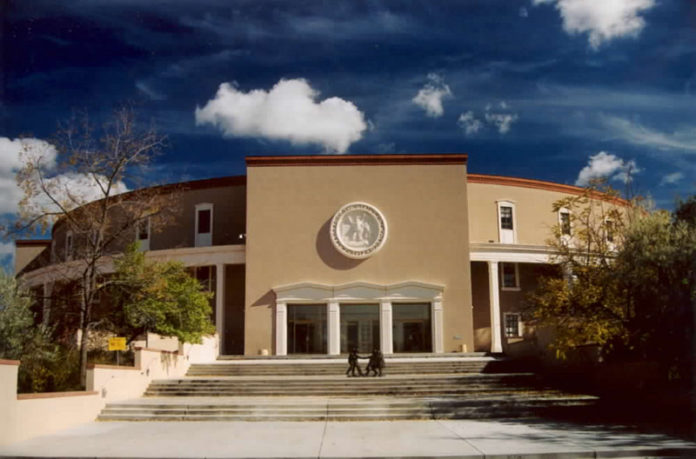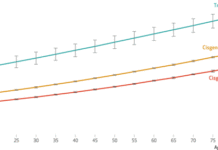
Gov. Michelle Lujan Grisham signed an executive order Monday, effective immediately, directing state agencies to collect voluntary data for informational purposes on the LGBTQ+ community.
The state Department of Health will be the lead agency, Lujan Grisham’s press secretary Nora Meyers Sackett wrote to NM Political Report. But all state agencies will be providing the voluntary questions asking individuals during in-take processes about sexual orientation and gender identity.
The order mirrors SB 316, the Gender and Orientation Data Collection bill which state Sen. Carrie Hamblen, D-Las Cruces, sponsored in the 2021 Legislature. That bill passed the Senate but died on the House floor before a vote.
Hamblen said collecting this data is important because, first, representation matters.
“That’s always the case when it comes down to communities that have been ignored,” Hamblen said.
But it also matters because there is a lack of data about the LGBTQ+ community and “the more we can collect the data across agencies, the more we can make comparisons to have a laser focus on inequities among LGBTQ+ folks,” said Marshall Martinez, executive director of Equality New Mexico.
Related: AHA: LGBTQ at greater risk for cardiovascular events and risks
Martinez said collecting this demographic information would also help with counting the numbers of LGBTQ+ individuals in the state because the U.S. census questions change “from time to time,” and the 2020 census, under then president Donald Trump, did not ask sexual orientation questions. Martinez said that fewer than five states have directed state agencies to collect this kind of data from its population and the federal government does not collect it.
“It will give us a better opportunity of understanding how much of the population we represent,” Martinez said.
Martinez said gathering this data across state agencies will enable the state and policy makers to identify differences within the LGBTQ+ community. It also is a way for the state to recognize LGBTQ+ people.
Martinez said that, until the order, the state asked gay men questions related to their sexual orientation only when they were tested for HIV and AIDS. But that “connects our identity only to sexual activity,” he said.
“I’m only gay when I’m at risk for STI’s [Sexually Transmitted Diseases]. It pushes LGBTQ+ folks into a space of feeling like who we are only matters in the context of risk,” he said.
The voluntary self-identification information will provide the state with data to improve the provisions of services to a traditionally underserved population, according to a statement from Lujan Grisham’s office.
The order will enhance the state’s ability to address health disparities and identify and remove barriers to effective care for non-conforming and traditionally underserved individuals, plus enhance services and outreach, according to the statement.
Martinez said an example of one way the information could help policy makers is in the area of behavioral health.
“I don’t know a single queer or trans person who didn’t struggle with depression and suicide. We know that’s true but we can’t necessarily go to the Legislature or the Executive and say, ‘we know this is a problem, just believe us.’ It’s really critical for us. This will confirm what most of us already know but give us the support we need to say, ‘this is an issue and we need to address it,’” Martinez said.
Some of the information the state will likely gather, based on the new questions about sexual orientation and gender identity, will be things such as demographic numbers of how many LGBTQ+ individuals who are using Department of Health services, including transgender individuals who may need reproductive healthcare but have been denied elsewhere, Hamblen said.
Other demographic information the state can gather would include if the New Mexico Corrections Department is placing transgender individuals in gender appropriate areas, how aging LGBTQ+ individuals are faring as a demographic through the New Mexico Department of Aging and Long-term Services Department and whether LGBTQ+ students are receiving an equitable and culturally responsible curriculum through the New Mexico Public Education Department, Hamblen said.
But, the collection of such data will still leave some gaps, Martinez said. One is the number of LGBTQ individuals within the unhoused, Martinez said.
Cities and nonprofit organizations operate shelters. The state does not.
Another difficulty will be reassuring the LGBTQ+ community that it is safe to fill out the questions, Martinez said.
For many years, gay men could not receive health insurance because health insurance companies assumed the HIV risk was too high, Martinez said.
“There is a whole generation of gay men who grew up when you didn’t answer those questions honestly because you would be denied services,” Martinez said.
Lujan Grisham said through a statement that gathering this information is an important tool in addressing inequities that LGBTQ+ individuals experience..
“This voluntary mechanism for demographic analysis is a tool the state of New Mexico can and will use to improve its service to traditionally underserved New Mexicans. I’m proud to have the chance to initiate that process,” she said through the statement.








